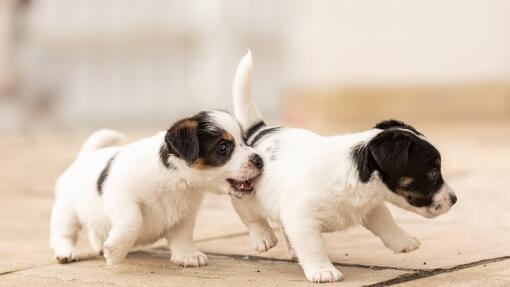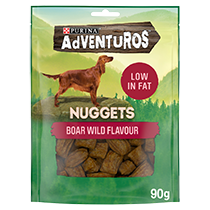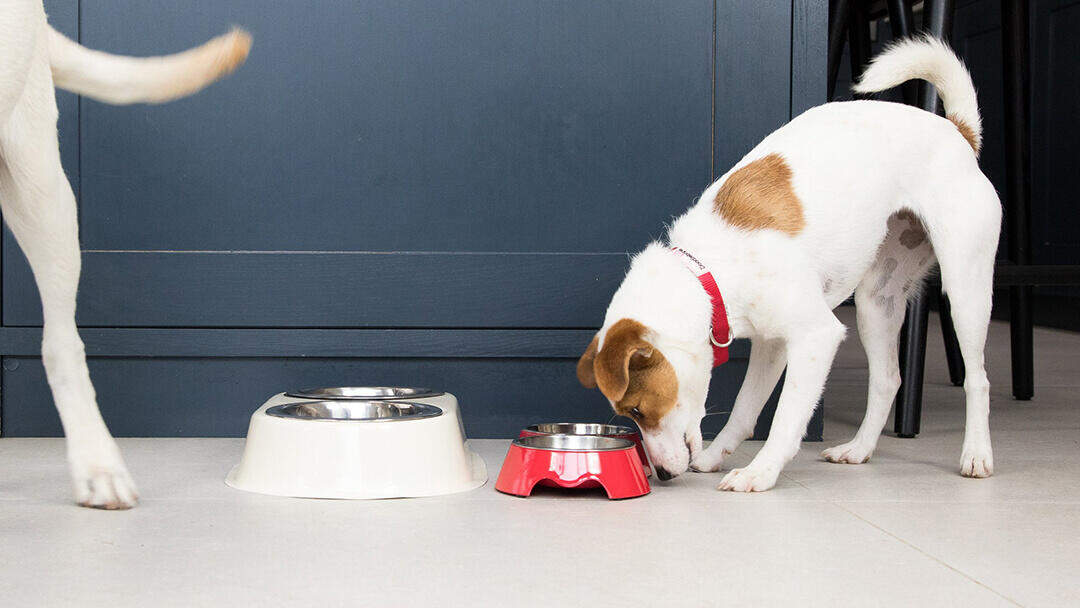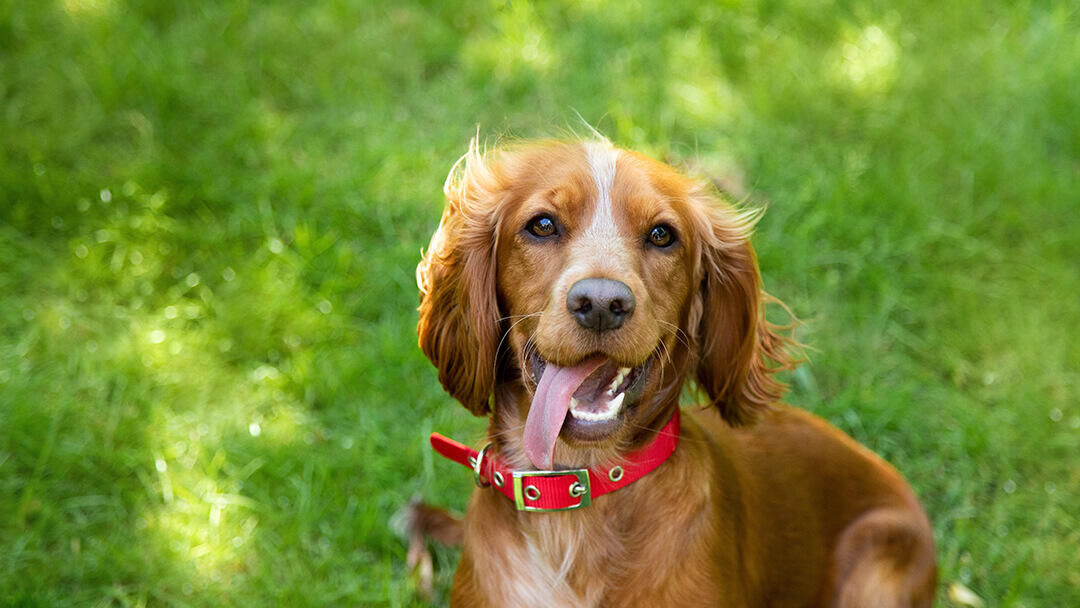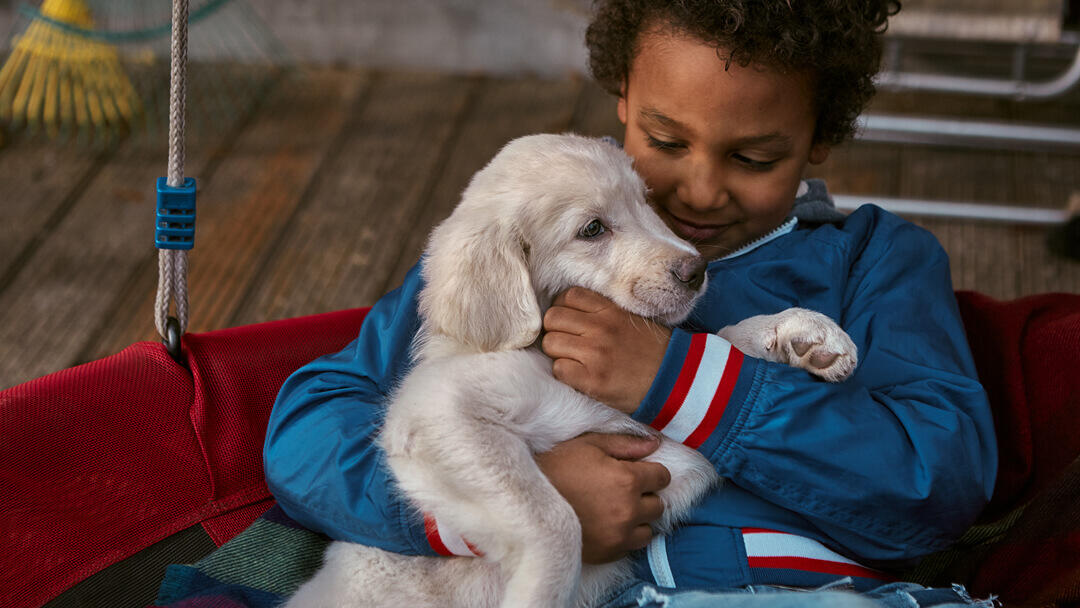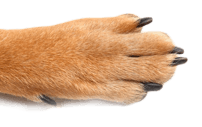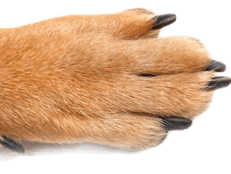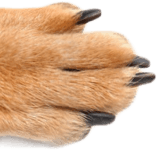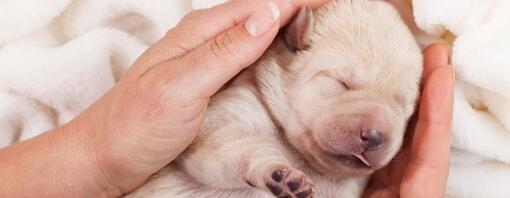
If you’ve found yourself with a litter of puppies on the way (especially if you are a first-time breeder or find yourself rearing puppies in rescue) it can be both an exciting and nerve-wracking time!
To take some of the stress out of looking after your new bundles of joy, we’ve put together this guide on new-born puppy care to tell you what to expect at each stage and what you can do to help them on their way to growing into healthy and happy adult dogs.
New-born puppy care week by week
From the initial checks at one week old to preparing them to go to their new home when they’re eight weeks, here’s the complete new-born puppy care week by week guide.
One week
At one week old new-born puppy care will be relatively simple as mum will be doing all of the work. They’ll sleep most the time and when they’re awake, they’ll be focused on feeding – growing is hard work after all!
During this time, find a good puppy socialisation/habituation programme that you can use to make sure they grow into happy, well-adjusted dogs ready for whatever their lives will hold in the future.
https://www.onlinevetsolutions.com/sites/hutcheson/PP_Brochure_Breeders_07_LO.pdf
Check them over
It’s important not to handle them excessively during this stage and that you give them time and space to bond with their mother and litter mates. We do encourage checking them over though, it may sound obvious but look for two eyes, two ears, correctly formed facial features, four clean limbs and a straight spine. If you spot a cleft palate, take them to the vet ASAP as they’ll be unable to nurse properly. If you have any health concerns at all, talk to your vet.
Ensure they’re feeding
Make sure they’re feeding properly during their first week. Puppies get colostrum from their mothers’ milk which contains antibodies to protect them during the early stages of their life and so this is vitally important. Watch them to make sure each puppy is getting their fair share of milk.
Start weighing
Start weighing them from birth and keep a weight chart and update it each day to ensure they’re gaining weight at a good rate. By 10 days old they should be double their birth weight! When you are weighing them, handle them quietly and take as little time as possible before putting them back next to mum so they don’t get chilled.
Keep them warm
New-born puppies can’t regulate their body temperature and rely on staying close to their mum or in a pile with their littermates. While they will receive warmth from their mum, she may not to spend all of her time in the whelping box, especially if she’s very bonded to her family.
Any absences from her puppies are fine providing they are of short duration and she’s keeping them well fed and happy, but you will need to find another heat source (such as a heat lamp) for when she’s out and about. Speak to your vet about your options.
Clean the whelping box regularly
Make sure you’re keeping the whelping box clean! Regularly change the bedding and pads and keep it smelling and looking fresh for mum and her pups.
Two weeks
Make sure you’re keeping the whelping box clean! Regularly change the bedding and pads and keep it smelling and looking fresh for mum and her pups.
Start turning the heat down
At this point the puppies are getting a little better at regulating their temperature, so if you’re providing an extra heat source you can begin turning it down until it reaches about 26 degrees Celsius.
Continue weighing
Keep monitoring their weight and make sure they’re still gaining. Weight gain may not be as quick as the first week at this stage, but they should still be increasing their weight. Make sure none of the puppies are growing a lot slower than the others. Consult your vet if this is the case.
Start deworming
Part of the new-born puppy care process at two weeks is to begin the deworming process! If you’re unsure about where to start, how much or what to give, consult your vet for guidance.
Three weeks
During the first two weeks of their lives, your puppies won’t be able to support their weight and will crawl around on their belly, but at two – three weeks, they’ll start to walk – albeit a bit wobbly! Around this age their eyesight begins to develop and their ears will open up too and they’ll start to be able to see and hear the world around them. Milk teeth will begin to develop at three weeks of age.
Handle them more frequently
Now the exciting part of your new-born puppy care process begins with more frequent handling. Begin to handle the puppies when you are sitting down on the floor. Pick them up carefully, hold them for a short while stroking them gently and talking to them, then place them back in the whelping box. This part is key in helping them learn that people are enjoyable to be with and are part of their ‘family’.
Continue weighing
It’s important to keep weighing them but at this stage you can reduce the frequency from every day to around every three days.
Lower the heat
If you’re providing an additional heat source, it’s time to reduce the heat to around 23 degrees Celsius.
Start offering water
You can start offering your puppies water at this stage. Get a shallow, puppy-safe dish and pop it in the whelping box with them to see what they make of it. They might drink it, or they might paddle in it!
Four weeks
At four weeks your puppies will be more physically developed and better coordinated, and should be walking quite confidently – even if not always successfully! They will be enjoying playing with their mum and their littermates and you will be able to begin to see their personalities developing.
Check their development
Look at their walking gait and their limbs – are they able to support their own weight properly? Do all their limbs look properly formed?
Keep an eye on behaviour
Puppies generally aren’t afraid of anything at this stage - they should be socialising confidently with their mum, siblings and you and interacting with the world around them. While there are always bold puppies and more thoughtful puppies in every litter, if any seem unduly withdrawn or timid, this may be a sign that something’s wrong and it’s a good idea to get them checked out by your vet.
Start introducing soft foods
You can start introducing soft puppy food at this point, but make sure it’s not too solid or hard as they’ll still have their milk teeth so need something that doesn’t need chewing.
More deworming
Puppies should be dewormed fortnightly until they’re 12 weeks old so when they’re four weeks old, it’s time to deworm again.
Five weeks
At five weeks you’ll have a litter of quite independent pups on your hands, and they’ll be confidently investigating everything and will be full of energy.
Spend lots of time with them
Handle your puppies lots, introduce them to new sights and sounds, and make time for plenty of playing and cuddles. Your puppy socialisation/habituation plan should be guiding you on tasks that you can do that will only take a few minutes a day.
More solid food
Mum will likely have naturally reduced the amount she feeds them by this stage, so it’s time to bring in more solids. Ensure you’re choosing a good quality puppy food that’s intended for growth and remember they’ll still have their milk teeth so if you’re giving them kibble, soften it with water.
Six – eight weeks
At around this stage your puppies will lose their milk teeth and towards the end of this time, their first ‘fear period’ will develop where they’ll learn to be wary or scared of things they haven’t encountered in the past. This is why socialisation and habituation is important in order to introduce them to as many sights, sounds and experiences that they’ll likely experience throughout their lives prior to this point so they grow up confident and secure.
Most puppies will be ready to fly the nest at around eight weeks old (although some toy breeds will stay with their mother and littermates till 12 weeks) so this part of the new-born puppy care schedule is all about getting them ready for their new homes.
Time to vaccinate
The first puppy vaccinations will usually be given between 6 – 8 weeks old where they’ll be inoculated against canine distemper, hepatitis, parvovirus, and parainfluenza virus. This is also the time to talk to the vet about microchipping. This can usually be done now unless your puppies are particularly tiny – and they do need to be microchipped before they go to their new homes.
Get them registered
If you have a purebred litter and you’re intending to register them, you can do so now.
Deworm again
Puppies should be wormed again at 6 weeks old and again at 8 weeks, continuing fortnightly until they’re 12 weeks.
A fully solid diet
The weaning process should be fully completed by this stage and your puppies should be eating a fully solid diet.
If you have any concerns about the development of your puppies, always consult your vet. Remember at the end of the day, it’s better to be safe than sorry!
That’s our very basic new born puppy care week by week guide! Looking for some more puppy advice? Read our article on helping your puppy with diarrhoea next.



